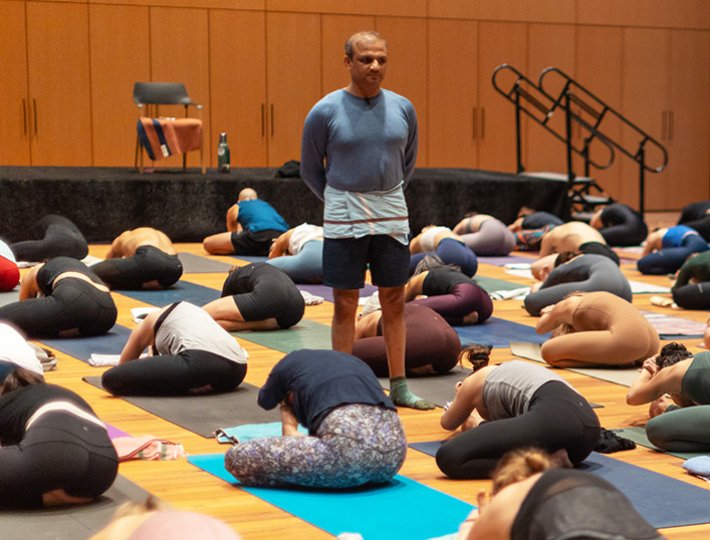It could be because my own wedding is any day now, but I’ve been thinking a lot about the Buddhist view of love. Our officiant, Susan Piver, writes in her new book The Four Noble Truths of Love that an important aspect of love in a long-term committed relationship is to stand together, shoulder-to-shoulder with the other person, especially in the midst of discomfort. While my partner and I have done that for a number of years, and are committing to doing that for the rest of our lives, we feel like we do need to revisit this principle with the challenge of our wedding day in mind. As tension mounts with the vast number of friends and family coming together, we have no doubt that discomfort will be present on the big day.
So, what is one to do when approaching a large gathering, like a wedding, family holiday, or even high school reunion? Tension surfaces, people get nervous, rarely does anyone say the right thing, but we all want to be happy and live a life of love, right? In Buddhism, there are these practices known as the four brahmaviharas, or four immeasurables, that we can engage in to promote and embrace love: loving-kindness, compassion, sympathetic joy, and equanimity. Each of these are aspects of love that we already possess and can cultivate in these massive group settings. The good news is that we won’t exhaust them because they are truly immeasurable. Let explain.
1. Loving-Kindness
Known in Sanskrit as maitri, the practice of loving-kindness is sometimes better translated as “friendship.” If we aim to practice loving-kindness at a wedding, we are offering a sense of friendship to ourself and others, through making aspirational verses for the people we know and love, the people we don’t know very well at all, and even those people we have a very difficult time with.
When I teach this practice, I begin by inviting people to start with offering loving-kindness to themselves because, as RuPaul once said, “If you don’t love yourself, how in the hell you gonna love somebody else?” If we don’t have a deep well of self-love to draw from, at some point the bucket is going to hit the bottom and we will have no love reserves from which to offer others. Through cultivating love for ourselves, we make this practice immeasurable.
Whether you’re like me, a key member of the wedding party, or invited as a guest to a huge celebration, you’re likely to encounter those people whom you love, those you don’t know very well, and maybe even a racist uncle you don’t like. What a perfect opportunity to wish each individual love and happiness. As I talk about in-depth in my forthcoming book, How to Be Decent: A Mindful Guide to a Messed Up World, whether you’re the bride, groom, or cousin no. 13, you can go about the room, acknowledging others, and silently make one or more of these aspirations for each person:
May you be happy
May you be healthy
May you feel safe
May you feel peaceful
May you feel loved
2. Compassion
A running theme throughout my next book is compassion, or in Sanskrit, karuna. Compassion is the desire to relieve the suffering of another. Having related to your own suffering and pain on the meditation cushion, you are more likely to open up our heart to other people you encounter. In the sometimes awkward, sometimes painful occasions of large groups of family and strangers coming together, you can be on the lookout for ways to show up in a compassionate manner. For example:
- Make conversation with people who seem a bit lonely
- Squeeze in time with the parents of the bride or groom
- Help out an overwhelmed family member
- Assist an elderly person in traversing the crowds
- If you’re in my position, as the groom or bride, you can make sure (to the best of your ability) to connect with everyone on your special day
Even though these types of large gatherings are meant to be moments of joy, they can often be stressful for some people. Aiming to be present enough to spot those occasions and provide some support is a deeply loving thing to do.
Related: A Loving-Kindness Practice for Strangers and Loved Ones
3. Sympathetic Joy
The third practice we can engage in comes from the Sanskrit word mudita, which is generally translated as “sympathetic joy.” If compassion is defined by recognizing the suffering of other people around you, sympathetic joy is defined by recognizing their happiness. The practice element here is rejoicing in the joy of others. When we are at a wedding or other big social events, this is simply basking in the glow of happiness that exists. Allow yourself some space to soak in the people around you. Notice an older couple on the dance floor or young children playing and just let yourself enjoy their joy.
Even if you’re the bride or groom, you can practice sympathetic joy on your wedding day. While it’s tempting to have the same conversation dozens of times, you can inquire about other people’s recent good news, celebrating and magnifying their success instead of solely focusing the spotlight on you. Sometimes, the quickest way for us to get out of our own head is to contemplate another person. When we practice sympathetic joy, we end up feeling joyful ourselves and other people feel supported and loved.
4. Equanimity
The Sanskrit word upeksha is commonly translated as “equanimity,” but I prefer Thich Nhat Hanh’s definition, which is “inclusiveness.” It indicates that we could open our heart to be inclusive enough that everyone we encounter at an event like this could be a recipient of our love. Thich Nhat Hanh said on this topic, “When you love one person, it’s an opportunity for you to love everyone, all beings.”
So much of our attention is focused on a couple at a wedding, but here we could practice little ways of opening our heart and making it inclusive of everyone attending. This includes the parents of the happy couple, the couple’s longtime friends, family members, and even the service staff, band members, and DJ. You are attending a celebration of love, and in that sense it’s the ideal setting to see how unabashedly you can offer your own open heart to whomever you meet. That said, if a sleazy groomsman hits on you, the word “no” is still a good option.








Comments (0)